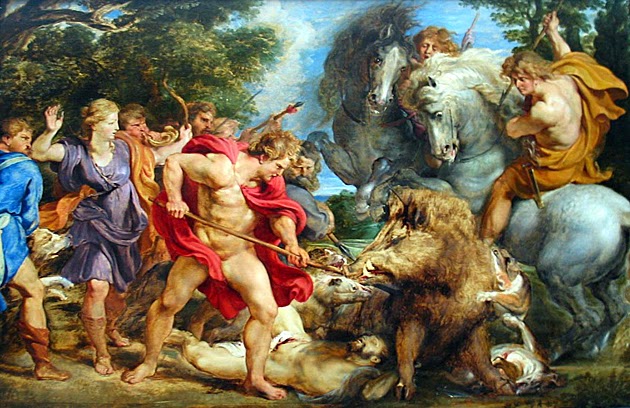Psamathe1
In Greek mythology, Psamathe was described as the goddess of (beach) sand, one of Naieid nymph, daughter of Nereus and Doris. Psamathe was the wife of Proteus, the old seal-herder of Poseidon. She bore him, Theoclymenus, a mortal son and Eidothea, a sea-nymph daughter.
Aeacus, the king of island Aegina, fell in love with Psamathe and he tried to seduce her on the beach. Psamathe tried to escape his grasp by transforming herself into a seal, but he refused to give up. So she let him had intercourse with her and gave birth to Phocus.
Phocus was the favorite of his father, which the jealousy of his half-brothers Peleus and Telamon. The pair conspired to murder him and were exiled from the island. In other version Phocus was killed accidentally by Peleus and Telamon. Psamathe was aggrieved and sent a giant wolf to harass the flocks of Peleus. However, through the advise of Thetis, Peleus wife and the sister of Psamathe, he managed to assuage the goddess with sacrifices.
Psamathe2
In Greek mythology, Psamathe was described as the daughter of Crotopus, king of Argos. Apollo, the god of music, fell in love with Psamathe, the beautiful princess of Argos. Apollo secretly came into Psamathe bed chamber and had intercourse with her. She became the mother of Linus by Apollo. Fearing her father she gave Linus to shepherds to be raised.
Later Psamathe was killed by her father, who would not believe that she had sexual intercourse with a god rather than a mortal. Apollo avenged Psamathe murder by sending a child-killing plague to Argos, which would not cease until the Argives (people of Argos), at the god's command, paid honors to Psamathe and Linus.
In other version, the baby Linus was torn apart by the king's sheepdogs upon being exposed and Apollo sent Poene, the personification of punishment, upon the city. Poene would steal children from their mothers until Coroebus killed her.
Index
In Greek mythology, Psamathe was described as the goddess of (beach) sand, one of Naieid nymph, daughter of Nereus and Doris. Psamathe was the wife of Proteus, the old seal-herder of Poseidon. She bore him, Theoclymenus, a mortal son and Eidothea, a sea-nymph daughter.
 |
| Psamathe |
Aeacus, the king of island Aegina, fell in love with Psamathe and he tried to seduce her on the beach. Psamathe tried to escape his grasp by transforming herself into a seal, but he refused to give up. So she let him had intercourse with her and gave birth to Phocus.
Phocus was the favorite of his father, which the jealousy of his half-brothers Peleus and Telamon. The pair conspired to murder him and were exiled from the island. In other version Phocus was killed accidentally by Peleus and Telamon. Psamathe was aggrieved and sent a giant wolf to harass the flocks of Peleus. However, through the advise of Thetis, Peleus wife and the sister of Psamathe, he managed to assuage the goddess with sacrifices.
Psamathe2
In Greek mythology, Psamathe was described as the daughter of Crotopus, king of Argos. Apollo, the god of music, fell in love with Psamathe, the beautiful princess of Argos. Apollo secretly came into Psamathe bed chamber and had intercourse with her. She became the mother of Linus by Apollo. Fearing her father she gave Linus to shepherds to be raised.
 |
| Psamathe |
Later Psamathe was killed by her father, who would not believe that she had sexual intercourse with a god rather than a mortal. Apollo avenged Psamathe murder by sending a child-killing plague to Argos, which would not cease until the Argives (people of Argos), at the god's command, paid honors to Psamathe and Linus.
In other version, the baby Linus was torn apart by the king's sheepdogs upon being exposed and Apollo sent Poene, the personification of punishment, upon the city. Poene would steal children from their mothers until Coroebus killed her.
Index






.jpg)


_Meleager_and_Atalante.jpg)